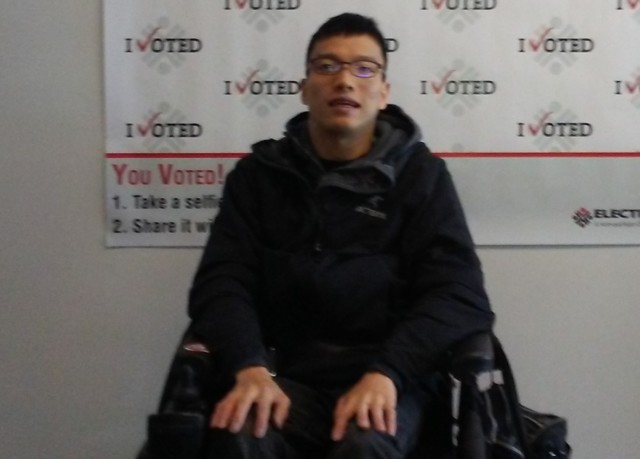Long waits for wheelchairs like having ‘your legs taken away,’ disability workers say
‘It feels like I am not a valued member of my community… I could disappear, and it’d be no big deal’

Glenda Hyatt bought a new scooter last week with money raised by her friends online. She gave up on the government assistance application after she was told it would take at least six months to approve. GoFundMe
Malone Mullin, CBC News March 27, 2018
From dashing between spotlights to decompressing at a local coffee shop, Glenda Hyatt is used to a high-octane lifestyle.
But that changed for the busy author and public speaker last month when Hyatt’s scooter sputtered to its death.
Hyatt, who has cerebral palsy and depends on her scooter to get to speaking engagements and run errands, scrambled to apply for a replacement vehicle through the province.
Hoping for help, she instead encountered a web of red tape.
From assessment to approval, Hyatt faced a six-month wait for a new scooter, she said — a relatively common occurrence for mobility aid users in B.C., according to disability workers.
“I could be stuck at home, basically under house arrest, until August,” she wrote in a Facebook post earlier this month, pointing out that she would have needed to drop her public speaking gigs, medical appointments and coffee dates.
“I am saddened that, for someone struggling with social isolation, I could be isolated even further.”
| Long waits, no loans |
Hyatt’s friends banded together, raising enough money to buy a second-hand scooter.
But many others don’t get that opportunity, says Sam Turcott, a director at Disability Alliance B.C.
Turcott points to “restrictive” disability assistance requirements that pare down eligibility to receive medical equipment coverage from the province.
He recalled a number of cases where mobility aid users were left waiting for an “inordinately long time” before acquiring a new set of wheels.

Kook, who receives disability benefits, paid out of pocket for a rental when his ministry-supplied power wheelchair needed repairs. Photo supplied by Taewon Kook
Taewon Kook, who uses a power wheelchair, says he too was stranded after his chair broke down. Although repairs were covered, Kook was forced to rent a wheelchair for $440, which he says took a hefty toll on his strict budget.
“That’s my credit bill for two months usually; $440 for my freedom of movement,” he said.
Kook’s chair has since been fixed, but he’s “being very careful with it,” he said, noting that the “onerous” application process makes him hesitant to request a new one.
| ‘Too many levels’ in approval process |
The Ministry of Social Development and Poverty Reduction, which is responsible for disability assistance, committed last month to review access to wheelchairs and other aids.
The current average wait time for a medical device, according to the ministry, is 46 days.
But red tape encumbers people with disabilities more often than B.C. Cerebral Palsy Association co-ordinator Jeanne Morton would like.
Waiting months for assessment appointments and ministry approval is “so common it’s kind of beyond complaint,” said Morton.
Morton says she’s known of cases that take nine months to over a year to approve and says that since equipment loans aren’t covered by the province, rentals for those on disability assistance can break the bank.
“These folks are often living on a thousand dollars a month,” she pointed out.
Morton stresses she’s no expert, but suspects from her own time working as a civil servant that the delays are due to “too many layers of government,” with the person holding the stamp too far removed from the person needing help.
Granting approval powers to social and health workers, the people dealing with patients face-to-face, could improve often-devastating wait times for wheelchair users, she suggests.
“If you can’t walk, and you have no chair, your legs are taken away,” she said. “Forget any paid employment, any socializing. And social isolation is a huge problem for people with disabilities to start with.”
Hyatt agrees, calling the current process “discouraging and disheartening.”
It “feels like I am not a valued member of my community, of society,” she said.
“I could disappear, and it’d be no big deal.”
| Malone Mullin is a digital journalist at CBC Toronto and CBC Vancouver. She’s a former features intern with CBC’s national desk and a grad student at the University of British Columbia. |
![]() Source CBC News
Source CBC News
Also see
From housing to sidewalks: making Vancouver a more disability-aware city in CBC News
Here are some simple ideas to help B.C.’s seniors and people with disabilities with housing in CBC News
